“The delivery of the Journeo solution has transformed the National Express operation.”
Graham Tanswell
Depot General Manager Stansted City
National Express
As London’s third-busiest airport, Stansted also operates one of Europe’s largest car parks, with over 35,000 spaces. Moving passengers and crew safely and efficiently between the car park and the terminal is essential to the airport’s entire operation.
Transfer operations for Stansted have been provided by National Express for many years and, following a competitive re-tendering process, they sought assistance from technology providers for solutions to help achieve service delivery targets set by the airport.
The pivotal role of bussing operations in air travel
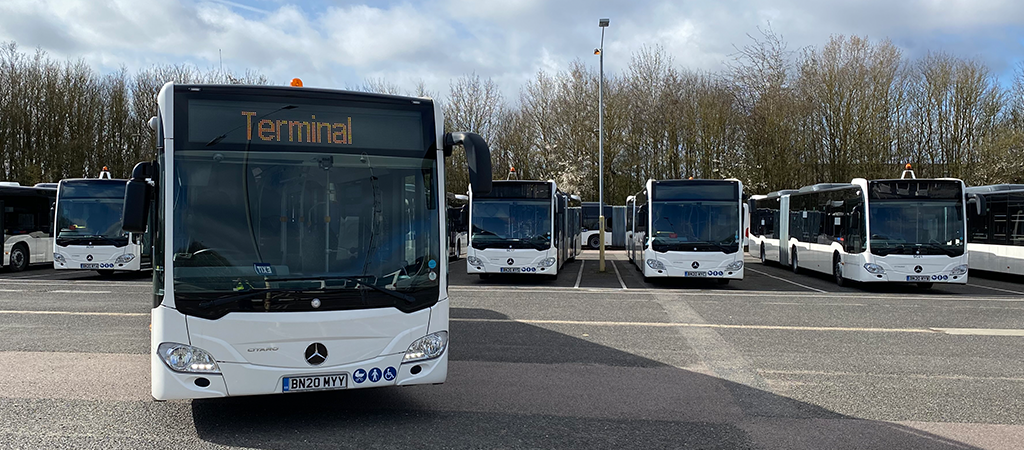
As Graham Tanswell, Depot General Manager Stansted City, National Express explains: “The new targets focus on the most important factor, the passenger travel experience.
Specifically, the transfer interval between the car park and terminal, and the return journey that every car park customer makes, and along with this, realtime journey updates to passengers while waiting for these services, and while on-board, relevant information about the journey and other useful service information.
“We needed a solution that could help us deliver this for our new fleet of vehicles, but also for existing buses, and to provide a single platform for accessing journey and other bus system data to prove our service delivery measurements.
“Having a single vendor solution was important for us, and we felt we could no longer operate with multiple independent systems. We needed a platform capable of capturing, analysing and actioning data from many systems and presenting performance data in a simple and accessible way.”
“As the car park transfer is often the first and then last element of a passenger’s experience of the airport, it leaves a lasting impression. It is vital that the SLAs are met.”
Leveraging emerging best practice
Headway management is a vital element of the new system; buses at Stansted don’t run to a timetable, but rather offer a service ‘at least every 10 minutes’. This requires a heavy degree of situational awareness, system integration and driver communication to keep vehicles running to time and serving all the car parks that are in operation at any one time.
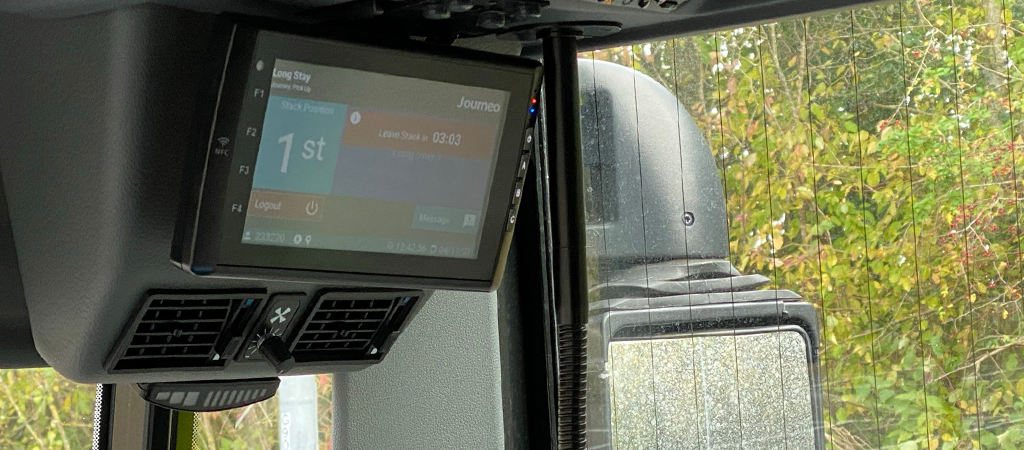
To meet this challenge, Journeo further developed their comprehensive transport system which was already in use at London’s Gatwick Airport.
The team worked closely with National Express to tailor the system and enhance it to meet their targets. The result is a comprehensive system which enables National Express to predict times of greater demand and divert vehicles and drivers accordingly to maintain the optimum gap between services, while minimising the level of manual operator input that is needed. It can also respond to any diversions, such as the closure of a terminal or the opening of an overflow car park.
Intelligently integrating systems and data
Every National Express vehicle at Stansted is connected to the Journeo Portal.
By gathering data from every trip, Journeo applies Machine Learning techniques to train the Portal to learn pinch points, diversionary routes and regular times of the day when delays are most likely, and to also handle exceptions.
This allows the Portal’s control of on-board passenger displays, and those in the car park shelters, to be updated in realtime with revised journey times if delays are likely.
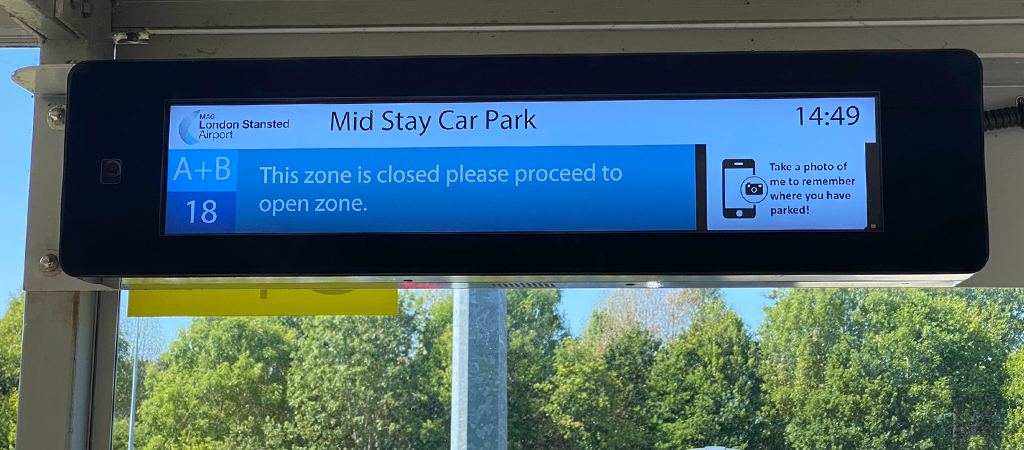
More intelligent automation is then used to actively manage the headway between vehicles to ensure the operation remains within service levels the airport publishes to car park users. Drivers are informed via their in-cab touchscreen when to start each journey, and should the demand on services increase, they can be moved to other car parks via their service control centre who monitor the Portal’s realtime service delivery screen.
“The system intelligence allows corrective action to be taken should the operation fall outside of SLAs.”
Compared to the previous situation, where drivers were constantly required to radio each other for positional updates, the new solution delivers a seamless automated system, where drivers can complete their shifts via instructions delivered directly into the cab.
Controllers can now focus on equally important activities, such as managing vehicle repairs and driver incidents, whilst operational management teams are able to confidently demonstrate that targets are being met.
The Journeo Portal also facilitates the creation of detailed reports through the Report Management module, which are specifically designed to demonstrate that National Express is meeting targets. It enables historical data to be analysed and future services to be planned accordingly.
The reports can be tailored for each audience, whether it is for planning purposes or reporting to stakeholders.
Giving passengers relevant and timely information
Advanced vehicle tracking also provides predictions of when buses will be departing from each bus stop. This is displayed on high-definition displays Journeo has installed at each bus stop and on-board passenger displays now include audio and visual next-stop announcements.
Once on-board, passengers can relax and enjoy the free Wi-Fi, safe in the knowledge that the onboard announcements will alert them to updates on their journey, informing them of upcoming stops.
The messages include the usual safety messaging, such as ‘hold on tight’ but includes additional safety advice. For example, to reduce accidents, National Express has added in messages to advise passengers how to alight safely, such as advising people with pushchairs to exit backwards.
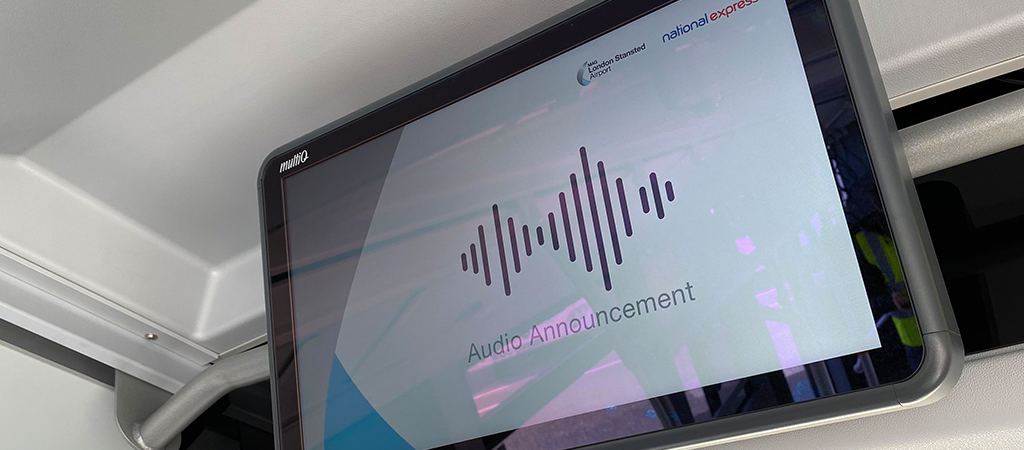
This improved, holistic passenger information system makes the service more predictable for passengers and gives them more confidence in the service.
The bus stops themselves also feature a new, added-value service for passengers. It is quite common for passengers to arrive at the airport and in their excitement, and with their focus being on catching their flight, forget where they parked.
The system has a ‘find my car’ feature, whereby drivers can scan a QR code at the bus stop to tag their location. They will then receive their location by email or text message to let them know which stop to alight at on their return, minimising lost passengers and calls to National Express’ customer service teams.
Increasing security and increasing confidence
The on-board CCTV systems, also supplied and fitted by Journeo, are also linked to the Journeo Portal. National Express can view live incidents via the IP cameras and download critical footage remotely, without having to visit the vehicle or take it off the road.
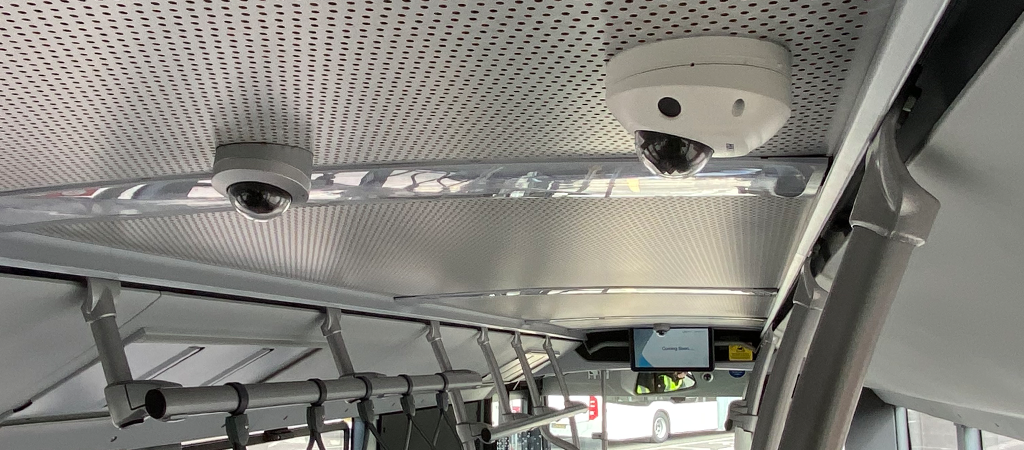
The Portal runs a health management check to keep systems operational and identify problems, often before they arise. Real-time vehicle tracking is also provided via a mapping system.
Another system linked to the Portal is the Journeo Passenger Counting system, which enables National Express to view occupancy and adjust services accordingly in real time.
For passengers with reduced mobility, there are clearly marked areas with a help point which, when pressed, alerts the National Express team to their presence who then divert a bus to the stop to pick them up.
Delivering significant savings and benefits
Because the Journeo system can allocate the right number of vehicles across all sites according to predicted demand, the outcome is a much more efficient service, leading to huge cost savings on fuel alone.
The resulting efficiencies save National Express in excess of £0.5m every year.
“The system is constantly learning. Each additional trip adds more system understanding of the service and as a result, adapts and improves predictions and output to passengers.
“London Stansted Airport can see clearly the quality of service we are providing and the improvements that we have made.
This ensures that all passengers have a positive and seamless experience in their transfers which, ultimately, reflects well on them as the airport operator.”